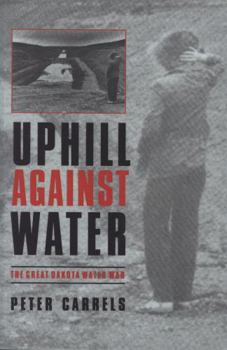Uphill Against Water: The Great Dakota Water War
Select Format
Select Condition 
Book Overview
In Uphill against Water, Peter Carrels examines the history of Missouri River water development projects in general and describes the struggle over one of the largest of those projects, South Dakota's Oahe irrigation project, in detail. Opposition to the Oahe project was intense and well organized. After four years of bitter competition, an energetic and resourceful grassroots group, United Family Farmers, wrested control of the Oahe conservancy...
Format:Paperback
Language:English
ISBN:080326397X
ISBN13:9780803263970
Release Date:February 1999
Publisher:University of Nebraska Press
Length:247 Pages
Weight:0.84 lbs.
Dimensions:0.6" x 6.0" x 8.9"
Customer Reviews
1 rating
A Lesson in Citizen Action
Published by Thriftbooks.com User , 24 years ago
This book covers the changing of the guard in American politics, when authority was no longer unquestioned and citizens were learning how to organize and exert their positions. In hindsight, it is amazing that such an ill conceived idea as transporting 800,000 cubic yards of water over 100 miles to irrigate land inherently unsuited to irrigation could have held sway for three decades before being exposed as impractical. The fact that this feat was accomplished by a handful of citizens, against the united desires of the press and business and political leaders, makes it even more interesting reading.During the period that this drama was being acted out, I served as a Special Assistant to the Governor of South Dakota, and I was impressed by the clear, interesting and straightforward telling of this story. While I would dispute some of the details, to a reader that did not live out this drama, these are of a minor consequence. As the staff member that authorized funding of the study of transporting Missouri River water to Wyoming, I can assure the readers that this study was done solely to determine the impact of providing clean, fresh water to ranches and small communities in western South Dakota and was completely unrelated to the Oahe project. Governor Kneip quickly distanced himself from this study when objections arose from our political base in eastern South Dakota. This study, however, documented the importance of clean water supplies to the public health and the raising of livestock. The rural water systems that were created in the wake of Oahe addressed this need and as the author noted, this was the lasting legacy of the Oahe Project.There is a natural tendency in books like this to paint the good guys as pure and the establishment as universally bad. In this case as part of the establishment, there were major differences of opinion within the Kneip administration on the feasibility and desirability of the Oahe Project. The decision to "leak" and make public a wide array of documents that were destined to aid the opponents was thoroughly debated and I admire Governor Kneip's tolerance of those that prevailed in providing the public the truth.The lesson that citizens can overcome incredible odds in fighting proposed developments is a fascinating story that deserved telling.






